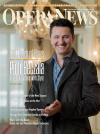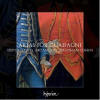Texte paru dans: / Appeared in:
*

Opera News: (09-2012)
Pour
s'abonner / Subscription information
Hyperion
CDA67924

0034571179247
Consultez toutes les évaluations recensées pour ce cd
~~~~ Reach all the evaluations located for this CD
I love the continuing trend of programming around one particular singer from the past. Successful matchups (Vivica Genaux and Farinelli, Lorraine Hunt Lieberson and Margherita Durastanti) introduce unfamiliar repertoire in an interesting context, and these tribute albums give the listener a real taste for the musical temperaments and range of two artists separated by centuries.
British countertenor Iestyn Davies seems well matched with the technique and artistry of Italian castrato Gaetano Guadagni (1728–92), a singer primarily known as the creator of the title role in Gluck’sOrfeo. It was for Guadagni that Handel spiffed up Messiah’s “But who may abide” with the rapid, virtuoso section, “For he is like a refiner’s fire.” Patricia Howard’s excellent CD notes argue that Guadagni, who started and finished a successful international career in his local church choir in Padua, and who worked constantly to improve his acting, even studying with the great Shakespearean David Garrick, might be considered the first modern opera singer. Refusing to interrupt performances by acknowledging applause or giving encores, Guadagni was apparently aiming at a more authentic dramatic experience, and contemporary writers noted his naturalistic style, passionate delivery and exquisite singing.
Davies, who returns to the Met this season as Trinculo in Thomas Adès’s The Tempest, takes a refreshing stance here, eschewing the coloratura stun-guns favored by many Baroque singers. He can crank out the roulades — although his easy handling of “Destructive war,” from Handel’s Belshazzar, or “Vengeance, O come inspire me!” from Thomas Arne’s Alfred,could use more energetic bite — but he is more at home in deliciously legato slow movements. Here, he can unfold a phrase calmly, giving perfect balance to decorative ornamental notes (as in “The raptur’d soul,” from Handel’s Theodora, and “Say, lovely Dream!” from The Fairies, by John Christopher Smith) and allowing trills all sorts of variety and expression.
Beginning the disc with the poised, gently shaped “O Lord, whose mercies numberless,” from Handel’s Saul, is an effectively understated attention-grabber, and it’s easy to imagine Gluck’s reforming zeal in fashioning the role of Orfeo for such a refined singer. “Che puro ciel,” Orfeo’s awed glimpse of the Elysian Fields, is gorgeous in its hushed delivery, but “Che farò senza Euridice,” stripped of desperate frenzy, verges on the thoughtfully tame. An excerpt from Gluck’s 1765 Telemaco is one of the disc’s high points, its controlled and peaceful atmosphere suiting Davies’s musical temperament perfectly.
Two arias from Johann Adolf Hasse’s Didone Abbandonata further illuminate Davies’s artistry; in “A trionfar mi chiama,” the gallant short–long rhythms characterize Aeneas as a hero going off to his destiny as founder of Rome, rather than a cad sneaking away from the injured queen Dido. Here the playing of Arcangelo, led by Jonathan Cohen, is especially noteworthy. A special curiosity is one of Guadagni’s own compositions, “Pensa a serbarmi, o cara,” which the singer used as an insertion aria for performances of Ezioby other composers.
Cliquez l'un ou l'autre
bouton pour découvrir bien d'autres critiques de CD
Click either button for many other reviews


